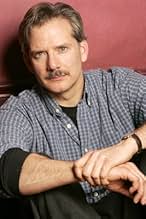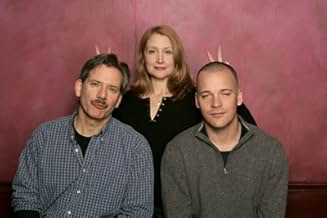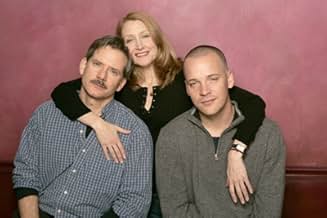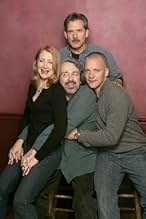IMDb RATING
6.4/10
2.5K
YOUR RATING
A grief-stricken screenwriter unknowingly enters a three-way relationship with a woman and her film executive husband - to chilling results.A grief-stricken screenwriter unknowingly enters a three-way relationship with a woman and her film executive husband - to chilling results.A grief-stricken screenwriter unknowingly enters a three-way relationship with a woman and her film executive husband - to chilling results.
- Awards
- 1 win & 2 nominations total
Craig Hamrick
- Party Guest
- (voice)
- (uncredited)
Jason-Shane Scott
- Robert's Masseuse
- (uncredited)
Bridgetta Tomarchio
- Female Guest
- (uncredited)
- Director
- Writer
- All cast & crew
- Production, box office & more at IMDbPro
Featured reviews
First off, the less you know about this movie before seeing it, the better. Go in clean. And just let it such you in. Here are a few things you CAN know. (a) The screenwriter/director, Craig Lucas, is gay but wrote his best known play, PRELUDE TO A KISS, about a straight relationship that has overtones of homosexuality. (b) Patricia Clarkson may be the finest actress of her age. She flits around the first 20 minutes of this movie in a bra and panties, toyingly svelt but with a panther-like quality you only realize later. (c) This is a movie without a protagonist or an antagonist -- or more accurate, a movie in which each of the main characters take turns at being the antagonist and protagonist. (d) Despite the gay aspects, this is really a movie about betrayal, and it is fiendishly mean (but in a good way). (e) Peter Sarsgaard has never looked handsomer. (f) That's all you need to know. See it.
I enjoyed this film, up to a point- and that point was almost exactly the half way mark, where the writer director chose to go the maudlin implausible route instead of sticking with what he had, which was wonderful.
To have three characters in conflict and resolve it without any fancy plot device would have been truly courageous, but sadly what started out so lovely descended into melodrama and tedium.
That being said, Craig Lucas is clearly a talent to watch, he did a marvelous job with the actors- particularly Peter Skaarsgard, who does wonderful work, and the script is smart and even touching in places.
Campbell Scott seemed miscast to me, wooden and distant at places but oddly brazen in others. I can't imagine a married studio executive actually touching and almost kissing a writer ON THE LOT. I found myself imagining what other actors would have done with the role, never a good sign. But then again, he was one of the producers, so Mr. Lucas had his hands tied.
All in all, the first act was so promising that I was angered by the way Lucas decided to end it.
To have three characters in conflict and resolve it without any fancy plot device would have been truly courageous, but sadly what started out so lovely descended into melodrama and tedium.
That being said, Craig Lucas is clearly a talent to watch, he did a marvelous job with the actors- particularly Peter Skaarsgard, who does wonderful work, and the script is smart and even touching in places.
Campbell Scott seemed miscast to me, wooden and distant at places but oddly brazen in others. I can't imagine a married studio executive actually touching and almost kissing a writer ON THE LOT. I found myself imagining what other actors would have done with the role, never a good sign. But then again, he was one of the producers, so Mr. Lucas had his hands tied.
All in all, the first act was so promising that I was angered by the way Lucas decided to end it.
Somehow, this movie managed to hold my interest despite the fact that I never really cared about the characters or what was going to happen to them next. It's not a love story. Not a very good relationship tale. Not a mystery or thriller. Instead, Dying Gaul is a modern day Greek tragedy that uses Hollywood and homosexuality as simply vehicles to generate interest.
This is Craig Lucas' first time in the director's chair. He wrote The Secret Lives of Dentists (previously at Sundance, starring Patricia Clarkson). The movies tackle the same themes---the value and meaning of marriage, the impact of dalliances, the complexities of finding happiness and satisfaction without veering from tradition. But Dying Gaul comes at it with a different orientation, and even outcome.
Patricia Clarkson is always excellent, but here she shows a little evil in her character, which is outside her normal range. Unfortunately, the rest of the cast comes off as wooden, certainly uninspired. Pay attention, because there are liberal doses of philosophy in the form of quotes and counsel. But the real tragedy here is the lack of a meaningful story or compelling characters.
This is Craig Lucas' first time in the director's chair. He wrote The Secret Lives of Dentists (previously at Sundance, starring Patricia Clarkson). The movies tackle the same themes---the value and meaning of marriage, the impact of dalliances, the complexities of finding happiness and satisfaction without veering from tradition. But Dying Gaul comes at it with a different orientation, and even outcome.
Patricia Clarkson is always excellent, but here she shows a little evil in her character, which is outside her normal range. Unfortunately, the rest of the cast comes off as wooden, certainly uninspired. Pay attention, because there are liberal doses of philosophy in the form of quotes and counsel. But the real tragedy here is the lack of a meaningful story or compelling characters.
"The Dying Gaul" feels like an updated "Who's Afraid of Virginia Woolf?" set in Hollywood instead of academia. But it gradually veers towards "Fatal Attraction" as the opening jabs at commercial film-making, with lots of name and title dropping that seem to be writer Craig Lucas's revenge on compromises he made for his successful "Prelude to a Kiss," give way to catastrophic psychological manipulation.
The initial Hollywood commentary is emphasized through the settings, as the movie producer, Campbell Scott, and his ex-writer/liberal activist/household and children manager wife, Patricia Clarkson, live in an extraordinary house with a rippling pool and ocean view. Their financial success is wielded like a weapon as the camera restlessly swoops around all their possessions, household help and scenic property. The emotional price he's paid for this is clear as Scott's "Jeffrey" could be in "Glengarry Glen Ross" (to drop film titles like he does) as he'll clearly do anything to seal a deal.
Peter Sarsgaard drives on to the studio lot and into their lives with a completely different character from his four other released films this year, with inflections and body language that only occasionally get a bit too flamboyant as affectations of an out gay writer discussing issues of sexuality in the movies and his late lover. His grief and need for human warmth is so palpable that it is even believable that after failing with psychological counseling and Buddhism to deal with it, he clutches at what used to be called spiritualism, here delivered through the internet, shown visually both in the written word and the actors talking to the camera like reading aloud from their computer screens, edited effectively in the best key scenes with real life.
Clarkson is wonderful as she morphs from busy housewife lounging in a fetching bikini, to curious dabbler in the dark side, to woman scorned and revengeful manipulator. She may be the Ultimate Scary Mother, sexy, maternal and controlling, who while distraught over violent video games goes after the psyche. Unusually for how such a triangle has been portrayed in films (and the film is specifically set in 1995 as perhaps a more innocent time), we also get brief, sympathetic insight on another woman similarly affected by the writer's selfish actions that puts Clarkson's "Elaine" in perspective as she could have been portrayed as more of a brittle harpy. But each character alternately attracts and repels us.
In his directing debut Lucas does not well serve his own script, adapted from his play, as it could have been a lot tauter in exploring the slippery slope of ethics in human relationships, that all it takes is that one small step to deceive or keep secrets before one falls into the well. There could have been a lot fewer arty scenes in silhouette, at sunset, across water.
The Steve Reich music throughout becomes more irritating than tension-inducing.
While the title has something to do with the writer's long monologue about the significance of the Roman sculpture as an artist's way to make victims sympathetic, one is left here more with the feeling that these three folks deserve each other, though the collateral damage left in their wake is a tragedy.
The initial Hollywood commentary is emphasized through the settings, as the movie producer, Campbell Scott, and his ex-writer/liberal activist/household and children manager wife, Patricia Clarkson, live in an extraordinary house with a rippling pool and ocean view. Their financial success is wielded like a weapon as the camera restlessly swoops around all their possessions, household help and scenic property. The emotional price he's paid for this is clear as Scott's "Jeffrey" could be in "Glengarry Glen Ross" (to drop film titles like he does) as he'll clearly do anything to seal a deal.
Peter Sarsgaard drives on to the studio lot and into their lives with a completely different character from his four other released films this year, with inflections and body language that only occasionally get a bit too flamboyant as affectations of an out gay writer discussing issues of sexuality in the movies and his late lover. His grief and need for human warmth is so palpable that it is even believable that after failing with psychological counseling and Buddhism to deal with it, he clutches at what used to be called spiritualism, here delivered through the internet, shown visually both in the written word and the actors talking to the camera like reading aloud from their computer screens, edited effectively in the best key scenes with real life.
Clarkson is wonderful as she morphs from busy housewife lounging in a fetching bikini, to curious dabbler in the dark side, to woman scorned and revengeful manipulator. She may be the Ultimate Scary Mother, sexy, maternal and controlling, who while distraught over violent video games goes after the psyche. Unusually for how such a triangle has been portrayed in films (and the film is specifically set in 1995 as perhaps a more innocent time), we also get brief, sympathetic insight on another woman similarly affected by the writer's selfish actions that puts Clarkson's "Elaine" in perspective as she could have been portrayed as more of a brittle harpy. But each character alternately attracts and repels us.
In his directing debut Lucas does not well serve his own script, adapted from his play, as it could have been a lot tauter in exploring the slippery slope of ethics in human relationships, that all it takes is that one small step to deceive or keep secrets before one falls into the well. There could have been a lot fewer arty scenes in silhouette, at sunset, across water.
The Steve Reich music throughout becomes more irritating than tension-inducing.
While the title has something to do with the writer's long monologue about the significance of the Roman sculpture as an artist's way to make victims sympathetic, one is left here more with the feeling that these three folks deserve each other, though the collateral damage left in their wake is a tragedy.
I would be hard pressed to name a trio of actors that I could be more excited to see than the stars of his film. Been rooting for Clarkson for years; we all know Sarsgaard is Oscar material in the years to come; Scott is (to me) even better than his dad. So I was waiting for this, via Craig Lucas, for a long time.
My cousin had warned me (we are both gay) that the play delivered a memorable first half (in a positive way) and just as memorable second half (in how bad it was). Clearly the screenplay did nothing to change this, alas.
The three leads were, no surprise, just excellent, and seeing them was well worth the time and cost. Oh PeterS, get back to work we need more of you! But dear Mr Lucas, when characters behave in ways that show no logic, it feels like a cheat.
Fascinating idea, beautiful setting, some splendid dialogue and then disaster sets. I say "6" and wish everyone involved great success in the years to come.
My cousin had warned me (we are both gay) that the play delivered a memorable first half (in a positive way) and just as memorable second half (in how bad it was). Clearly the screenplay did nothing to change this, alas.
The three leads were, no surprise, just excellent, and seeing them was well worth the time and cost. Oh PeterS, get back to work we need more of you! But dear Mr Lucas, when characters behave in ways that show no logic, it feels like a cheat.
Fascinating idea, beautiful setting, some splendid dialogue and then disaster sets. I say "6" and wish everyone involved great success in the years to come.
Did you know
- TriviaThe film is dedicated to writer/director Craig Lucas's best friend, playwright Tony Kushner.
- ConnectionsFeatured in 2006 Glitter Awards (2006)
- How long is The Dying Gaul?Powered by Alexa
Details
- Release date
- Country of origin
- Official site
- Language
- Also known as
- El gal moribund
- Filming locations
- Production companies
- See more company credits at IMDbPro
Box office
- Budget
- $4,000,000 (estimated)
- Gross US & Canada
- $342,747
- Opening weekend US & Canada
- $53,944
- Nov 6, 2005
- Gross worldwide
- $345,041
- Runtime
- 1h 32m(92 min)
- Color
- Sound mix
- Aspect ratio
- 1.85 : 1
Contribute to this page
Suggest an edit or add missing content












































